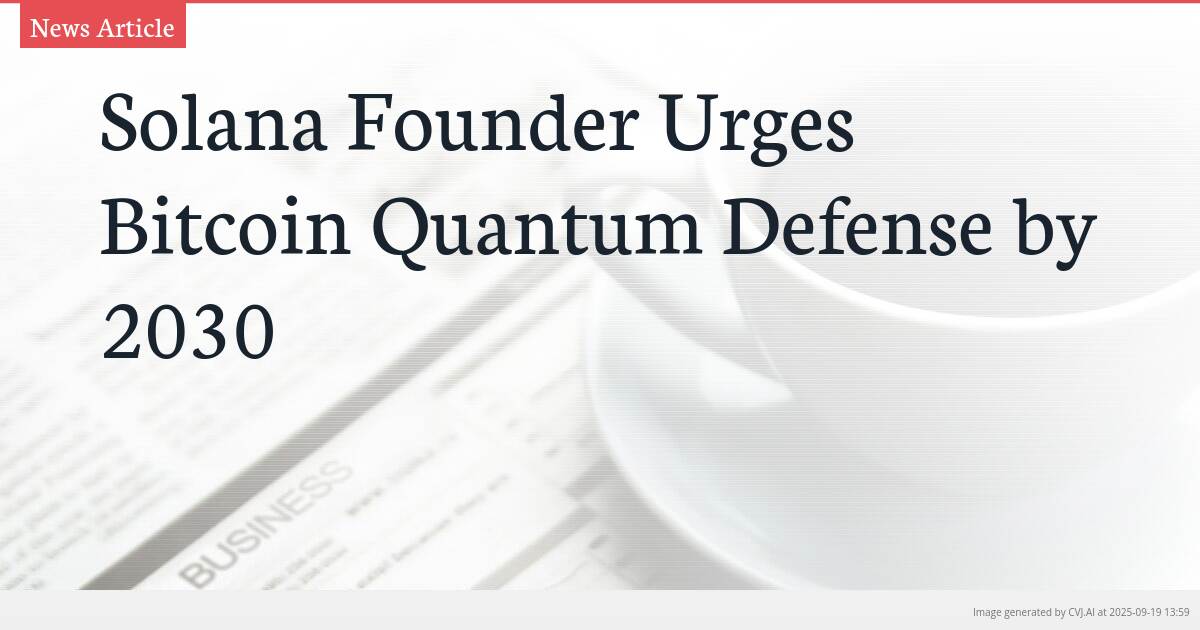Introduction
Solana co-founder Anatoly Yakovenko has issued a stark warning to the Bitcoin community, predicting a 50/50 chance of a quantum computing breakthrough by 2030 that could compromise Bitcoin’s cryptographic security. Speaking at the All-In Summit 2025, Yakovenko urged immediate acceleration toward quantum-resistant signature schemes, citing the rapid pace of AI implementation as a model for how quickly quantum threats could materialize.
Key Points
- Yakovenko predicts 50% probability of quantum computing breakthrough within 5 years based on AI acceleration patterns
- Current Bitcoin signature schemes would be vulnerable to quantum attacks without cryptographic upgrades
- Urgent call for Bitcoin community to develop and implement quantum-resistant security protocols
The Quantum Threat Timeline
Anatoly Yakovenko’s prediction represents a significant acceleration of traditional quantum computing timelines. While many experts have projected quantum threats as a distant concern, the Solana founder’s assessment places potential vulnerability within a five-year window. “I feel 50/50 within five years, there is a quantum breakthrough,” Yakovenko stated, basing his timeline on observed patterns of technological convergence and implementation speed.
The urgency stems from Yakovenko’s observation of how artificial intelligence has transformed from research papers to practical applications at “astounding” speeds. This pattern suggests quantum computing could follow a similar accelerated trajectory, potentially catching the cryptocurrency ecosystem unprepared. His warning specifically targets Bitcoin, the world’s largest cryptocurrency by market capitalization, whose security model relies on cryptographic signatures that quantum computers could theoretically break.
Bitcoin's Cryptographic Vulnerability
Bitcoin’s current security infrastructure, particularly its Elliptic Curve Digital Signature Algorithm (ECDSA), would be fundamentally vulnerable to sufficiently powerful quantum computers. These machines could potentially solve the mathematical problems underlying Bitcoin’s cryptography in hours rather than the millennia required by classical computers. This vulnerability extends to both transaction security and the protection of wallet private keys.
Yakovenko’s call to “migrate Bitcoin to a quantum-resistant signature scheme” acknowledges that proactive measures are necessary before quantum capabilities become operational. The transition would require community consensus, technical development, and careful implementation to avoid disrupting Bitcoin’s network stability. Unlike traditional financial systems that can implement security upgrades centrally, Bitcoin’s decentralized nature makes such fundamental changes particularly complex and time-consuming.
The Race Against Quantum Advancement
The cryptocurrency industry faces a unique challenge in preparing for quantum threats while maintaining operational stability. Yakovenko’s comments highlight the tension between technological innovation and security preparedness. “I would try to encourage folks to speed things up,” he emphasized, suggesting that current development pace might be insufficient given the accelerated threat timeline.
Several quantum-resistant cryptographic solutions already exist in various stages of development, including lattice-based cryptography, hash-based signatures, and multivariate cryptography. However, implementing these at Bitcoin’s scale requires extensive testing, community buy-in, and careful coordination to ensure backward compatibility and network security during transition periods.
The Solana founder’s warning serves as both a technical alert and a call to action for the broader cryptocurrency community. As quantum computing advances continue to accelerate, the window for developing and implementing quantum-resistant solutions may be shorter than previously anticipated, making Yakovenko’s urgent timeline a critical consideration for Bitcoin’s long-term security planning.
📎 Source reference: cointelegraph.com

